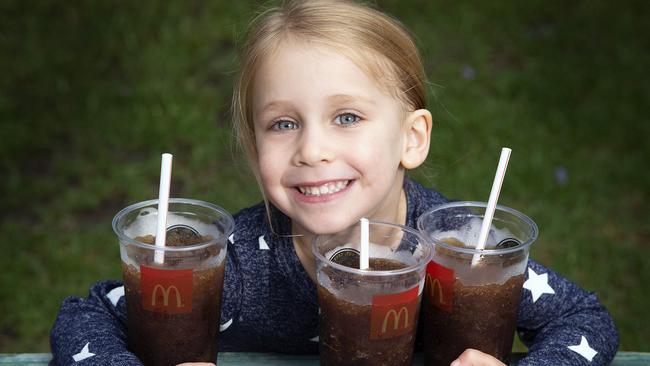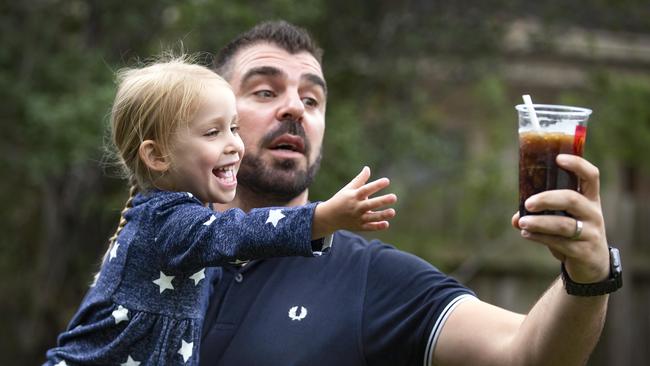Peppa Pig and cheap frozen Coke behind nagging kids and sugary drink demands
Kids under the age of five are consuming fizzy drinks in “alarming quantities”, and a popular cartoon character is the reason why.

VIC News
Don't miss out on the headlines from VIC News. Followed categories will be added to My News.
Kids as young as two are pestering their parents for sugary drinks and cheap frozen Cokes after seeing them marketed alongside their favourite cartoon characters.
New research shows while parents know sweet drinks are bad for preschoolers many give in because children’s whingeing or tantrums wears them down.
Aussie kids aged under five were consuming sugary drinks in “alarming quantities” as a result.
“Children cannot discriminate between what’s real and what’s marketing, which is why we want this marketing to children stopped,” researcher Alexandra Chung said.
“When a child goes to the supermarket and sees Peppa Pig on a drink that marketing is influencing their decision to pester their parent to buy it.
“Parents are telling us that this marketing is everywhere.
“It’s through the food court if they take their children to the shopping centre, it’s in the supermarket if they’ve got their kids in the trolley.
“It’s on the TV, it’s outside shops on billboards.
“It’s everywhere that parents go and that makes it very difficult because it’s in children’s faces all the time and parents have told us that it’s very difficult to say: ‘No’.”
Parents and grandparents were interviewed about what drinks they gave children and why as part of the Deakin University study.
They were also asked what would help them make healthier choices.

Pricing was a big influence, especially when families were out of the house and it was cheaper to buy sweet drinks than water.
A bottle of water can cost upwards of $4 — more than most sugary alternatives.
“A particularly stark example raised by parents was $1 frozen Cokes,” Ms Chung, a visiting researcher at Deakin’s Institute of Health Transformation and a Monash PHD candidate, said.
“Insidious” marketing was also driving pester power and policy changes were needed to help parents, she said.
“Parents have to face very difficult decisions multiple times per day, so from a health perspective, if we can make the environment easier for parents why wouldn’t we?” Ms Chung said.
“Individuals have a choice, we’re all responsible for our own choices but if the environment we’re in doesn’t support us to be healthy, then that makes it really difficult.”
Global Obesity Centre researcher and study co-author Kathryn Backholer said it was crucial to improve the diets of preschool children because eating and drinking habits were formed at an early age.
Sugary drinks were also a huge risk factor for childhood obesity and dental decay, Ms Backholer said.
MORE NEWS
TODDLER CLINGS TO LIFE AS FAMILY KEEP VIGIL
EMERGENCY WARNING FOR FRENCH ISLAND BLAZE
US FIREFIGHTERS ARRIVE IN MELBOURNE
Two in three Australian children were regularly consuming sweet drinks such as cordial, juice, soft drink and flavoured milk by the age of two.
Cheltenham’s Harry Potter — dad to Ivy, 3, and Iris, 5, — said he doesn’t let his kids have soft drink but will allow fruit juice “once in a blue moon” such as at a restaurant.
He said parents should be conscious about what they give to children.
“They’re hyper enough already and don’t need the extra sugar,” he said.

